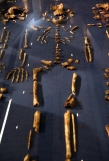Scientists have found a huge cache of bones belonging to a previously unknown humanoid species in a cave in South Africa. It's an astonishing discovery.
No one knows exactly how old they are, but the remains of at least 15 individuals have been found so far, with possibly more to come. Homo Naledi is like us, but not like us: slender, small-brained, with feet and hands like ours but curved fingers like those of apes.
There's already an argument about whether this is an entirely new species. Some scientists are saying these are just specimens of Homo Erectus, already known to have lived in southern Africa around 1.5 million years ago. Others are convinced that this is something really new.
For some Christians, talk about early forms of human is a real problem. If God created the world a few thousand years ago, and humans as we know them today were made instantaneously in a special act of creation, what are we to do with these human-like specimens? Not only do they have ape-like and humanoid characteristics, but they're thought to have lived hundreds of thousands or even millions of years ago.
The problems come with a very literalistic interpretation of Genesis. Aside from the dating issue, people who hold this can say that these specimens were simply apes, though evidence of tool-using (not, so far, in the case of Homo Naledi) makes this difficult to sustain. Or they can say that they were human, though the anatomical evidence is against them.
It's not an interpretation I find convincing. So when I read about Homo Naledi, I'm happy to go along with the scientific consensus: that during the course of human evolution there were several different Homo species, some of which died out or were out-competed by others, and some of which, like Neanderdals, interbred with our own Homo Sapiens which came to dominate.
I'm fascinated by the story of human evolution. But what intrigues me most, as a believer, is how humans and humanoids seem, from the very beginnings of their self-awareness as autonomous individuals, to have a sense of what we might call the soul.

What's fascinating for people of faith is where Homo Naledi remains were found: in an all-but-inaccessible cavern far from the light of day, where they had evidently been brought deliberately as part of a burial ritual.
So did they believe in some sort of survival after death? Was it simply a sense that their own dead should be treated differently from dead animals? Was there grief at parting, and a desire for those who had died to rest together? These are all very human instincts, and though we know that animals do feel grief, they don't behave like Homo Naledi.
There is no way of recovering what was in their minds. We can be sure that it would bear very little relation to anything Christian theology teaches us to believe. But it still shows they knew that death was not an absolute ending, and that those who had died were still, in some way, present.
In Ecclesiastes 3, the Preacher says that God has "set eternity in the human heart" (verse 11). He then, as is his wont, turns devil's advocate: "Surely the fate of human beings is like that of the animals; the same fate awaits them both: As one dies, so dies the other. All have the same breath; humans have no advantage over animals. Everything is meaningless. All go to the same place; all come from dust, and to dust all return. Who knows if the human spirit rises upward and if the spirit of the animal goes down into the earth?" (19-21, NIV).
In these words, though, there's a recognition of something essential about being human: that, however we're to understand this, the "human spirit rises upward".
If Homo Naledi understood this, at the very least we need to expand our definition of what it is to be human. And instead of seeing them as a problem to be solved or ignored, they are another testimony to the overflowing creativity of God, who gives life to all creatures and gives human beings, of whatever kind, eternal significance.
I'm not worried by the thought that other kinds of human might have lived hundreds of thousands or millions of years ago. It makes me appreciate more of the power of God. It makes me wonder about life on other worlds, too: if Homo Sapiens isn't the only form of life God loved into existence on earth, why shouldn't there be life elsewhere in the universe?
And it makes the thought that God would send his Son to be incarnate at one particular time, in one particular species, to redeem the world, even more astonishing. As the Psalmist says: "When I consider your heavens, the work of your fingers, the moon and the stars, which you have ordained; what is man that you take thought of him, and the son of man that you care for him?" (8:3-4).
Follow @RevMarkWoods on Twitter.














